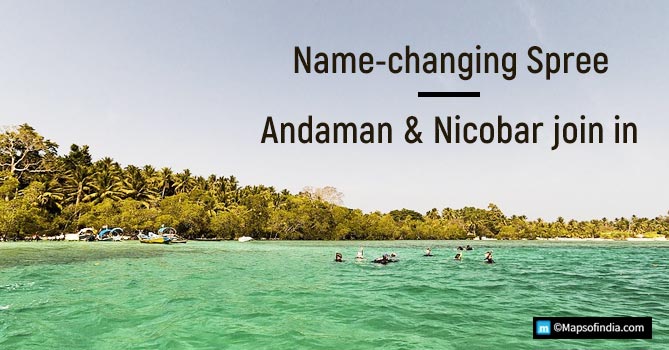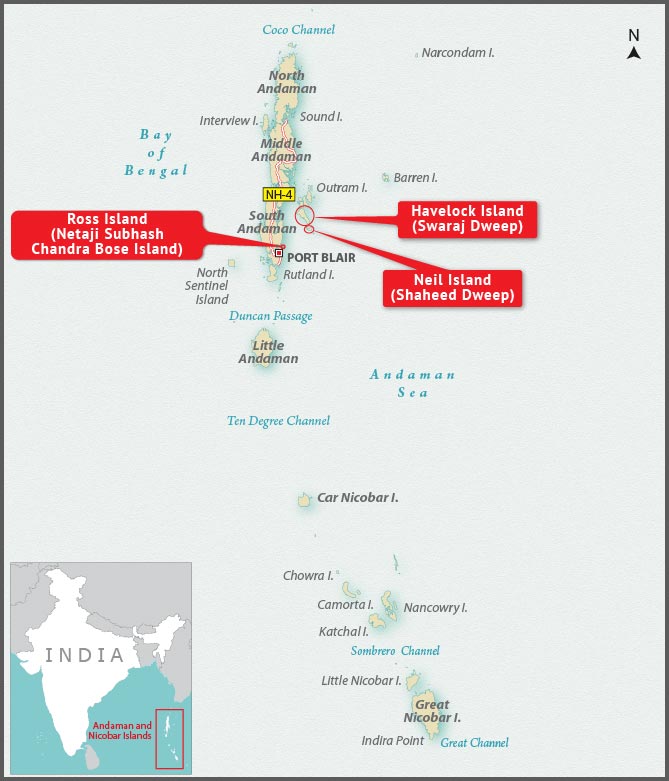The year might be coming to an end, but there seems to be no stop ahead for the name-changing “train” in the nation.
On December 30, 2018, Prime Minister Narendra Modi will visit the Andaman & Nicobar islands, along with Home Minister Rajnath Singh. The PM will be hoisting the national flag in Port Blair, commemorating a similar ceremony held there by Subash Chandra Bose in 1943. However, the day is in highlights for another reason this time around.
PM Modi will be announcing the official name change of three main native islands- Havelock Island, Neil Island, and Ross Island; to be called Swaraj Dweep, Shaheed Dweep, and Netaji Subash Chandra Bose Island respectively. Want to know the entire story? Read on!
Why are the names being changed?
In March 2017, a BJP leader LA Ganesan had suggested changing the name of Havelock islands, since its origins can be traced back to Sir Henry Havelock- a British general. Ganesan urged that carrying the same name forward would be a matter of shame- a reason that has since then been cited multiple times by people. The British sounding names, according to many, are a reminder of the cruel colonisation of the country, and should, therefore, be changed.
But, why these specific new names and not something else? Well, that has a history of its own. During World War II, the Andaman & Nicobar islands were captured from the imperial rule by the Japanese force, in 1943. Acting as an accomplice to the Japanese was the Arzi Hukumate Azad Hind (or Indian National Army, as popularly known) of Subash Chandra Bose.
On 30th December 1943, Netaji hoisted the national flag in Port Blair, declaring the formation of an Azad Hind government. Allegedly, it was also then that he renamed the islands as “Shaheed Dweep” and “Swaraj Dweep”. To many, this works as a perfect reason to justify the latest name-changing.
A look at the practice
To say that the BJP government and the art of renaming share a special bond, wouldn’t be wrong. In the past year, multiple places have their names changed, often to end up in controversies. Some notable ones have been that of Allahabad to Prayagraj, Faizabad to Ayodhya, and so on.
Recently, the Chief Minister of Gujarat, Vijay Rupani hinted at his government’s keen interest in changing the name of Ahmedabad to Karnavati.
An opinion
An obvious question that pops its head in the argument is- do the current names of the three islands serve as a reminder of the British colonialism? Well, in a sense, yes, it does. But, does changing the name of a place serve any purpose whatsoever? Not really.
Like many people argue, name-changing does not change the history. Defenders state that these new names will amend the tattered history, as desperately needed. But, one cannot, and perhaps even should not deny history.
Bose suggested changing the names of the Andaman & Nicobar islands, not its three smaller components. Doing so then acts not as a tribute to the man, but perhaps just a political agenda. Another subtle irony surfaces if you look closely at the history of the islands. Many islanders criticise Netaji because the Japanese takeover resulted in mass brutalities and causalities for the natives. What purpose does it fulfill then, to rename the islands?
Conclusion
Was changing the names of these islands absolutely necessary, be it for whatever reason? Absolutely not. But, for the sake of the argument, let’s assume it was. In that case, wouldn’t it perhaps be more suited to use indigenous names, thereby acknowledging the legacy and the identity of the Islanders? It is their native lands we are talking about, after all.
The truth, however, remains where it was. Name-changing serves no tangible purpose. Many have begun to criticise this latest move by stating that more focus should have been paid on improving the infrastructure and facilities of the islands instead. Come to think of it, doesn’t sound absolutely devoid of logic, does it?
Let us know what you think in the comments below.







